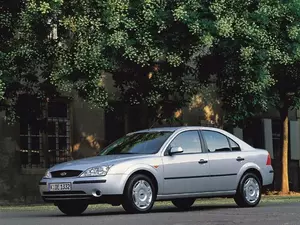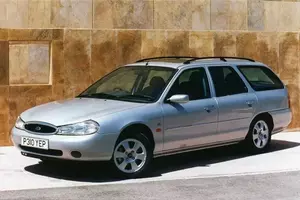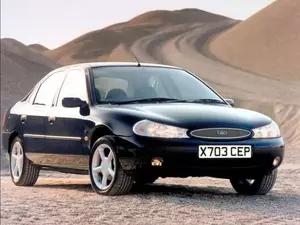


Mondeo Wagon IV (facelift 2019)

2019 Mondeo IV Hatchback (facelift 2019)

2019 Mondeo IV Sedan (facelift 2019)

Mondeo Sedan IV

Mondeo Hatchback IV

Mondeo Wagon IV

Mondeo Hatchback III (facelift 2010)

Mondeo Wagon III (facelift 2010)

Mondeo Hatchback III

Mondeo Wagon III

Mondeo Sedan III

Mondeo Hatchback II

Mondeo Wagon II

Mondeo Sedan II

Mondeo Seadn I (facelift 1996)

Mondeo Wagon I (facelift 1996)

Mondeo Hatchback I (facelift 1996)

Mondeo Sedan I

Mondeo Hatchback I

Mondeo Wagon I

| Vehicle | Curb weight | Difference from world's smallest | Weight to power ratio | 0—60 mph acceleration ratio | Consumption ratio |
|---|---|---|---|---|---|
| 1.5 EcoBoost |
1554 kg / 3427 lbs |
1129 kg (2490 lbs) heavier | 9 kg to 1 hp | 147 kg/s (324 lbs/s) |
207 kg/L (456 lbs/L) |
| 2.0 EcoBlue |
1677 kg / 3698 lbs |
1252 kg (2761 lbs) heavier | 9 kg to 1 hp | 195 kg/s (430 lbs/s) |
329 kg/L (725 lbs/L) |
| 2.0 |
1641 kg / 3618 lbs |
1216 kg (2681 lbs) heavier | 9 kg to 1 hp | 184 kg/s (406 lbs/s) |
373 kg/L (822 lbs/L) |
| Vehicle | 1.5 EcoBoost |
|---|---|
| Curb weight |
1554 kg / 3427 lbs |
| Difference from world's smallest | 1129 kg (1129 lbs) heavier |
| Weight to power ratio | 9 kg to 1 hp |
| 0—60 mph acceleration ratio | 147 kg/s (324 lbs/s) |
| Consumption ratio |
207 kg/L (456 lbs/L) |
| Vehicle | 2.0 EcoBlue |
| Curb weight |
1677 kg / 3698 lbs |
| Difference from world's smallest | 1252 kg (1252 lbs) heavier |
| Weight to power ratio | 9 kg to 1 hp |
| 0—60 mph acceleration ratio | 195 kg/s (430 lbs/s) |
| Consumption ratio |
329 kg/L (725 lbs/L) |
| Vehicle | 2.0 |
| Curb weight |
1641 kg / 3618 lbs |
| Difference from world's smallest | 1216 kg (1216 lbs) heavier |
| Weight to power ratio | 9 kg to 1 hp |
| 0—60 mph acceleration ratio | 184 kg/s (406 lbs/s) |
| Consumption ratio |
373 kg/L (822 lbs/L) |

| Vehicle | Curb weight | Difference from world's smallest | Weight to power ratio | 0—60 mph acceleration ratio | Consumption ratio |
|---|---|---|---|---|---|
| 2.0 EcoBlue |
1707 kg / 3764 lbs |
1282 kg (2827 lbs) heavier | 14 kg to 1 hp | 158 kg/s (348 lbs/s) |
379 kg/L (836 lbs/L) |
| 1.5 EcoBoost |
1612 kg / 3554 lbs |
1187 kg (2617 lbs) heavier | 10 kg to 1 hp | 154 kg/s (340 lbs/s) |
221 kg/L (487 lbs/L) |
| Vehicle | 2.0 EcoBlue |
|---|---|
| Curb weight |
1707 kg / 3764 lbs |
| Difference from world's smallest | 1282 kg (1282 lbs) heavier |
| Weight to power ratio | 14 kg to 1 hp |
| 0—60 mph acceleration ratio | 158 kg/s (348 lbs/s) |
| Consumption ratio |
379 kg/L (836 lbs/L) |
| Vehicle | 1.5 EcoBoost |
| Curb weight |
1612 kg / 3554 lbs |
| Difference from world's smallest | 1187 kg (1187 lbs) heavier |
| Weight to power ratio | 10 kg to 1 hp |
| 0—60 mph acceleration ratio | 154 kg/s (340 lbs/s) |
| Consumption ratio |
221 kg/L (487 lbs/L) |

| Vehicle | Curb weight | Difference from world's smallest | Weight to power ratio | 0—60 mph acceleration ratio | Consumption ratio |
|---|---|---|---|---|---|
| 2.0 |
1624 kg / 3581 lbs |
1199 kg (2644 lbs) heavier | 9 kg to 1 hp | 187 kg/s (412 lbs/s) |
387 kg/L (853 lbs/L) |
| Vehicle | 2.0 |
|---|---|
| Curb weight |
1624 kg / 3581 lbs |
| Difference from world's smallest | 1199 kg (1199 lbs) heavier |
| Weight to power ratio | 9 kg to 1 hp |
| 0—60 mph acceleration ratio | 187 kg/s (412 lbs/s) |
| Consumption ratio |
387 kg/L (853 lbs/L) |

| Vehicle | Curb weight | Difference from world's smallest | Weight to power ratio | 0—60 mph acceleration ratio | Consumption ratio |
|---|---|---|---|---|---|
| 1.0 EcoBoost |
1454 kg / 3206 lbs |
1029 kg (2269 lbs) heavier | 12 kg to 1 hp | 128 kg/s (282 lbs/s) |
285 kg/L (628 lbs/L) |
| 1.5 EcoBoost |
1504 kg / 3316 lbs |
1079 kg (2379 lbs) heavier | 9 kg to 1 hp | 175 kg/s (386 lbs/s) |
239 kg/L (527 lbs/L) |
| 1.6 TDCi |
1493 kg / 3292 lbs |
1068 kg (2355 lbs) heavier | 13 kg to 1 hp | 130 kg/s (287 lbs/s) |
355 kg/L (783 lbs/L) |
| 2.0 TDCi |
1524 kg / 3360 lbs |
1099 kg (2423 lbs) heavier | 7 kg to 1 hp | 203 kg/s (448 lbs/s) |
318 kg/L (701 lbs/L) |
| 2.0 EcoBoost |
1562 kg / 3444 lbs |
1137 kg (2507 lbs) heavier | 8 kg to 1 hp | 188 kg/s (415 lbs/s) |
214 kg/L (472 lbs/L) |
| 2.0 iVCT |
1504 kg / 3316 lbs |
1079 kg (2379 lbs) heavier | 8 kg to 1 hp | 173 kg/s (381 lbs/s) |
358 kg/L (789 lbs/L) |
| Vehicle | 1.0 EcoBoost |
|---|---|
| Curb weight |
1454 kg / 3206 lbs |
| Difference from world's smallest | 1029 kg (1029 lbs) heavier |
| Weight to power ratio | 12 kg to 1 hp |
| 0—60 mph acceleration ratio | 128 kg/s (282 lbs/s) |
| Consumption ratio |
285 kg/L (628 lbs/L) |
| Vehicle | 1.5 EcoBoost |
| Curb weight |
1504 kg / 3316 lbs |
| Difference from world's smallest | 1079 kg (1079 lbs) heavier |
| Weight to power ratio | 9 kg to 1 hp |
| 0—60 mph acceleration ratio | 175 kg/s (386 lbs/s) |
| Consumption ratio |
239 kg/L (527 lbs/L) |
| Vehicle | 1.6 TDCi |
| Curb weight |
1493 kg / 3292 lbs |
| Difference from world's smallest | 1068 kg (1068 lbs) heavier |
| Weight to power ratio | 13 kg to 1 hp |
| 0—60 mph acceleration ratio | 130 kg/s (287 lbs/s) |
| Consumption ratio |
355 kg/L (783 lbs/L) |
| Vehicle | 2.0 TDCi |
| Curb weight |
1524 kg / 3360 lbs |
| Difference from world's smallest | 1099 kg (1099 lbs) heavier |
| Weight to power ratio | 7 kg to 1 hp |
| 0—60 mph acceleration ratio | 203 kg/s (448 lbs/s) |
| Consumption ratio |
318 kg/L (701 lbs/L) |
| Vehicle | 2.0 EcoBoost |
| Curb weight |
1562 kg / 3444 lbs |
| Difference from world's smallest | 1137 kg (1137 lbs) heavier |
| Weight to power ratio | 8 kg to 1 hp |
| 0—60 mph acceleration ratio | 188 kg/s (415 lbs/s) |
| Consumption ratio |
214 kg/L (472 lbs/L) |
| Vehicle | 2.0 iVCT |
| Curb weight |
1504 kg / 3316 lbs |
| Difference from world's smallest | 1079 kg (1079 lbs) heavier |
| Weight to power ratio | 8 kg to 1 hp |
| 0—60 mph acceleration ratio | 173 kg/s (381 lbs/s) |
| Consumption ratio |
358 kg/L (789 lbs/L) |

| Vehicle | Curb weight | Difference from world's smallest | Weight to power ratio | 0—60 mph acceleration ratio | Consumption ratio |
|---|---|---|---|---|---|
| 2.0 TDCi |
1525 kg / 3363 lbs |
1100 kg (2426 lbs) heavier | 7 kg to 1 hp | 203 kg/s (448 lbs/s) |
318 kg/L (701 lbs/L) |
| 1.0 EcoBoost |
1455 kg / 3208 lbs |
1030 kg (2271 lbs) heavier | 12 kg to 1 hp | 128 kg/s (282 lbs/s) |
285 kg/L (628 lbs/L) |
| 1.6 TDCi |
1495 kg / 3296 lbs |
1070 kg (2359 lbs) heavier | 13 kg to 1 hp | 130 kg/s (287 lbs/s) |
356 kg/L (785 lbs/L) |
| 1.5 EcoBoost |
1505 kg / 3319 lbs |
1080 kg (2382 lbs) heavier | 9 kg to 1 hp | 175 kg/s (386 lbs/s) |
239 kg/L (527 lbs/L) |
| 2.0 EcoBoost |
1564 kg / 3449 lbs |
1139 kg (2512 lbs) heavier | 7 kg to 1 hp | 209 kg/s (461 lbs/s) |
214 kg/L (472 lbs/L) |
| Vehicle | 2.0 TDCi |
|---|---|
| Curb weight |
1525 kg / 3363 lbs |
| Difference from world's smallest | 1100 kg (1100 lbs) heavier |
| Weight to power ratio | 7 kg to 1 hp |
| 0—60 mph acceleration ratio | 203 kg/s (448 lbs/s) |
| Consumption ratio |
318 kg/L (701 lbs/L) |
| Vehicle | 1.0 EcoBoost |
| Curb weight |
1455 kg / 3208 lbs |
| Difference from world's smallest | 1030 kg (1030 lbs) heavier |
| Weight to power ratio | 12 kg to 1 hp |
| 0—60 mph acceleration ratio | 128 kg/s (282 lbs/s) |
| Consumption ratio |
285 kg/L (628 lbs/L) |
| Vehicle | 1.6 TDCi |
| Curb weight |
1495 kg / 3296 lbs |
| Difference from world's smallest | 1070 kg (1070 lbs) heavier |
| Weight to power ratio | 13 kg to 1 hp |
| 0—60 mph acceleration ratio | 130 kg/s (287 lbs/s) |
| Consumption ratio |
356 kg/L (785 lbs/L) |
| Vehicle | 1.5 EcoBoost |
| Curb weight |
1505 kg / 3319 lbs |
| Difference from world's smallest | 1080 kg (1080 lbs) heavier |
| Weight to power ratio | 9 kg to 1 hp |
| 0—60 mph acceleration ratio | 175 kg/s (386 lbs/s) |
| Consumption ratio |
239 kg/L (527 lbs/L) |
| Vehicle | 2.0 EcoBoost |
| Curb weight |
1564 kg / 3449 lbs |
| Difference from world's smallest | 1139 kg (1139 lbs) heavier |
| Weight to power ratio | 7 kg to 1 hp |
| 0—60 mph acceleration ratio | 209 kg/s (461 lbs/s) |
| Consumption ratio |
214 kg/L (472 lbs/L) |

| Vehicle | Curb weight | Difference from world's smallest | Weight to power ratio | 0—60 mph acceleration ratio | Consumption ratio |
|---|---|---|---|---|---|
| 1.5 EcoBoost |
1527 kg / 3367 lbs |
1102 kg (2430 lbs) heavier | 10 kg to 1 hp | 176 kg/s (388 lbs/s) |
235 kg/L (518 lbs/L) |
| 1.6 TDCi |
1514 kg / 3338 lbs |
1089 kg (2401 lbs) heavier | 13 kg to 1 hp | 129 kg/s (284 lbs/s) |
352 kg/L (776 lbs/L) |
| 1.0 EcoBoost |
1476 kg / 3255 lbs |
1051 kg (2318 lbs) heavier | 12 kg to 1 hp | 128 kg/s (282 lbs/s) |
284 kg/L (626 lbs/L) |
| 2.0 TDCi |
1544 kg / 3405 lbs |
1119 kg (2468 lbs) heavier | 7 kg to 1 hp | 201 kg/s (443 lbs/s) |
309 kg/L (681 lbs/L) |
| 2.0 EcoBoost |
1584 kg / 3493 lbs |
1159 kg (2556 lbs) heavier | 7 kg to 1 hp | 208 kg/s (459 lbs/s) |
211 kg/L (465 lbs/L) |
| Vehicle | 1.5 EcoBoost |
|---|---|
| Curb weight |
1527 kg / 3367 lbs |
| Difference from world's smallest | 1102 kg (1102 lbs) heavier |
| Weight to power ratio | 10 kg to 1 hp |
| 0—60 mph acceleration ratio | 176 kg/s (388 lbs/s) |
| Consumption ratio |
235 kg/L (518 lbs/L) |
| Vehicle | 1.6 TDCi |
| Curb weight |
1514 kg / 3338 lbs |
| Difference from world's smallest | 1089 kg (1089 lbs) heavier |
| Weight to power ratio | 13 kg to 1 hp |
| 0—60 mph acceleration ratio | 129 kg/s (284 lbs/s) |
| Consumption ratio |
352 kg/L (776 lbs/L) |
| Vehicle | 1.0 EcoBoost |
| Curb weight |
1476 kg / 3255 lbs |
| Difference from world's smallest | 1051 kg (1051 lbs) heavier |
| Weight to power ratio | 12 kg to 1 hp |
| 0—60 mph acceleration ratio | 128 kg/s (282 lbs/s) |
| Consumption ratio |
284 kg/L (626 lbs/L) |
| Vehicle | 2.0 TDCi |
| Curb weight |
1544 kg / 3405 lbs |
| Difference from world's smallest | 1119 kg (1119 lbs) heavier |
| Weight to power ratio | 7 kg to 1 hp |
| 0—60 mph acceleration ratio | 201 kg/s (443 lbs/s) |
| Consumption ratio |
309 kg/L (681 lbs/L) |
| Vehicle | 2.0 EcoBoost |
| Curb weight |
1584 kg / 3493 lbs |
| Difference from world's smallest | 1159 kg (1159 lbs) heavier |
| Weight to power ratio | 7 kg to 1 hp |
| 0—60 mph acceleration ratio | 208 kg/s (459 lbs/s) |
| Consumption ratio |
211 kg/L (465 lbs/L) |

| Vehicle | Curb weight | Difference from world's smallest | Weight to power ratio | 0—60 mph acceleration ratio | Consumption ratio |
|---|---|---|---|---|---|
| 2.0 EcoBoost |
1569 kg / 3460 lbs |
1144 kg (2523 lbs) heavier | 7 kg to 1 hp | 221 kg/s (487 lbs/s) |
204 kg/L (450 lbs/L) |
| 1.6 16V |
1435 kg / 3164 lbs |
1010 kg (2227 lbs) heavier | 12 kg to 1 hp | 123 kg/s (271 lbs/s) |
211 kg/L (465 lbs/L) |
| 2.0 TDCI |
1573 kg / 3468 lbs |
1148 kg (2531 lbs) heavier | 10 kg to 1 hp | 175 kg/s (386 lbs/s) |
281 kg/L (620 lbs/L) |
| 2.0 16V |
1477 kg / 3257 lbs |
1052 kg (2320 lbs) heavier | 10 kg to 1 hp | 157 kg/s (346 lbs/s) |
187 kg/L (412 lbs/L) |
| 2.2 TDCI |
1599 kg / 3526 lbs |
1174 kg (2589 lbs) heavier | 8 kg to 1 hp | 208 kg/s (459 lbs/s) |
267 kg/L (589 lbs/L) |
| Vehicle | 2.0 EcoBoost |
|---|---|
| Curb weight |
1569 kg / 3460 lbs |
| Difference from world's smallest | 1144 kg (1144 lbs) heavier |
| Weight to power ratio | 7 kg to 1 hp |
| 0—60 mph acceleration ratio | 221 kg/s (487 lbs/s) |
| Consumption ratio |
204 kg/L (450 lbs/L) |
| Vehicle | 1.6 16V |
| Curb weight |
1435 kg / 3164 lbs |
| Difference from world's smallest | 1010 kg (1010 lbs) heavier |
| Weight to power ratio | 12 kg to 1 hp |
| 0—60 mph acceleration ratio | 123 kg/s (271 lbs/s) |
| Consumption ratio |
211 kg/L (465 lbs/L) |
| Vehicle | 2.0 TDCI |
| Curb weight |
1573 kg / 3468 lbs |
| Difference from world's smallest | 1148 kg (1148 lbs) heavier |
| Weight to power ratio | 10 kg to 1 hp |
| 0—60 mph acceleration ratio | 175 kg/s (386 lbs/s) |
| Consumption ratio |
281 kg/L (620 lbs/L) |
| Vehicle | 2.0 16V |
| Curb weight |
1477 kg / 3257 lbs |
| Difference from world's smallest | 1052 kg (1052 lbs) heavier |
| Weight to power ratio | 10 kg to 1 hp |
| 0—60 mph acceleration ratio | 157 kg/s (346 lbs/s) |
| Consumption ratio |
187 kg/L (412 lbs/L) |
| Vehicle | 2.2 TDCI |
| Curb weight |
1599 kg / 3526 lbs |
| Difference from world's smallest | 1174 kg (1174 lbs) heavier |
| Weight to power ratio | 8 kg to 1 hp |
| 0—60 mph acceleration ratio | 208 kg/s (459 lbs/s) |
| Consumption ratio |
267 kg/L (589 lbs/L) |

| Vehicle | Curb weight | Difference from world's smallest | Weight to power ratio | 0—60 mph acceleration ratio | Consumption ratio |
|---|---|---|---|---|---|
| 2.0 EcoBoost |
1588 kg / 3502 lbs |
1163 kg (2565 lbs) heavier | 7 kg to 1 hp | 215 kg/s (474 lbs/s) |
206 kg/L (454 lbs/L) |
| 2.0 TDCI |
1592 kg / 3510 lbs |
1167 kg (2573 lbs) heavier | 11 kg to 1 hp | 161 kg/s (355 lbs/s) |
284 kg/L (626 lbs/L) |
| 1.6 16V |
1455 kg / 3208 lbs |
1030 kg (2271 lbs) heavier | 12 kg to 1 hp | 121 kg/s (267 lbs/s) |
214 kg/L (472 lbs/L) |
| 2.0 16V |
1496 kg / 3299 lbs |
1071 kg (2362 lbs) heavier | 10 kg to 1 hp | 153 kg/s (337 lbs/s) |
189 kg/L (417 lbs/L) |
| 2.2 TDCI |
1615 kg / 3561 lbs |
1190 kg (2624 lbs) heavier | 8 kg to 1 hp | 204 kg/s (450 lbs/s) |
269 kg/L (593 lbs/L) |
| Vehicle | 2.0 EcoBoost |
|---|---|
| Curb weight |
1588 kg / 3502 lbs |
| Difference from world's smallest | 1163 kg (1163 lbs) heavier |
| Weight to power ratio | 7 kg to 1 hp |
| 0—60 mph acceleration ratio | 215 kg/s (474 lbs/s) |
| Consumption ratio |
206 kg/L (454 lbs/L) |
| Vehicle | 2.0 TDCI |
| Curb weight |
1592 kg / 3510 lbs |
| Difference from world's smallest | 1167 kg (1167 lbs) heavier |
| Weight to power ratio | 11 kg to 1 hp |
| 0—60 mph acceleration ratio | 161 kg/s (355 lbs/s) |
| Consumption ratio |
284 kg/L (626 lbs/L) |
| Vehicle | 1.6 16V |
| Curb weight |
1455 kg / 3208 lbs |
| Difference from world's smallest | 1030 kg (1030 lbs) heavier |
| Weight to power ratio | 12 kg to 1 hp |
| 0—60 mph acceleration ratio | 121 kg/s (267 lbs/s) |
| Consumption ratio |
214 kg/L (472 lbs/L) |
| Vehicle | 2.0 16V |
| Curb weight |
1496 kg / 3299 lbs |
| Difference from world's smallest | 1071 kg (1071 lbs) heavier |
| Weight to power ratio | 10 kg to 1 hp |
| 0—60 mph acceleration ratio | 153 kg/s (337 lbs/s) |
| Consumption ratio |
189 kg/L (417 lbs/L) |
| Vehicle | 2.2 TDCI |
| Curb weight |
1615 kg / 3561 lbs |
| Difference from world's smallest | 1190 kg (1190 lbs) heavier |
| Weight to power ratio | 8 kg to 1 hp |
| 0—60 mph acceleration ratio | 204 kg/s (450 lbs/s) |
| Consumption ratio |
269 kg/L (593 lbs/L) |

| Vehicle | Curb weight | Difference from world's smallest | Weight to power ratio | 0—60 mph acceleration ratio | Consumption ratio |
|---|---|---|---|---|---|
| 1.6 i 16V |
1477 kg / 3257 lbs |
1052 kg (2320 lbs) heavier | 13 kg to 1 hp | 122 kg/s (269 lbs/s) |
205 kg/L (452 lbs/L) |
| 2.0 i 16V |
1477 kg / 3257 lbs |
1052 kg (2320 lbs) heavier | 10 kg to 1 hp | 157 kg/s (346 lbs/s) |
187 kg/L (412 lbs/L) |
| 2.0 TDCi |
1503 kg / 3314 lbs |
1078 kg (2377 lbs) heavier | 12 kg to 1 hp | 145 kg/s (320 lbs/s) |
212 kg/L (467 lbs/L) |
| 1.6i 16v |
1477 kg / 3257 lbs |
1052 kg (2320 lbs) heavier | 12 kg to 1 hp | 126 kg/s (278 lbs/s) |
200 kg/L (441 lbs/L) |
| 2.2 TDCi |
1481 kg / 3266 lbs |
1056 kg (2329 lbs) heavier | 8 kg to 1 hp | 178 kg/s (392 lbs/s) |
239 kg/L (527 lbs/L) |
| 2.5 i 20V |
1492 kg / 3290 lbs |
1067 kg (2353 lbs) heavier | 7 kg to 1 hp | 210 kg/s (463 lbs/s) |
160 kg/L (353 lbs/L) |
| 2.3 i 16V |
1466 kg / 3233 lbs |
1041 kg (2296 lbs) heavier | 9 kg to 1 hp | 147 kg/s (324 lbs/s) |
158 kg/L (348 lbs/L) |
| Vehicle | 1.6 i 16V |
|---|---|
| Curb weight |
1477 kg / 3257 lbs |
| Difference from world's smallest | 1052 kg (1052 lbs) heavier |
| Weight to power ratio | 13 kg to 1 hp |
| 0—60 mph acceleration ratio | 122 kg/s (269 lbs/s) |
| Consumption ratio |
205 kg/L (452 lbs/L) |
| Vehicle | 2.0 i 16V |
| Curb weight |
1477 kg / 3257 lbs |
| Difference from world's smallest | 1052 kg (1052 lbs) heavier |
| Weight to power ratio | 10 kg to 1 hp |
| 0—60 mph acceleration ratio | 157 kg/s (346 lbs/s) |
| Consumption ratio |
187 kg/L (412 lbs/L) |
| Vehicle | 2.0 TDCi |
| Curb weight |
1503 kg / 3314 lbs |
| Difference from world's smallest | 1078 kg (1078 lbs) heavier |
| Weight to power ratio | 12 kg to 1 hp |
| 0—60 mph acceleration ratio | 145 kg/s (320 lbs/s) |
| Consumption ratio |
212 kg/L (467 lbs/L) |
| Vehicle | 1.6i 16v |
| Curb weight |
1477 kg / 3257 lbs |
| Difference from world's smallest | 1052 kg (1052 lbs) heavier |
| Weight to power ratio | 12 kg to 1 hp |
| 0—60 mph acceleration ratio | 126 kg/s (278 lbs/s) |
| Consumption ratio |
200 kg/L (441 lbs/L) |
| Vehicle | 2.2 TDCi |
| Curb weight |
1481 kg / 3266 lbs |
| Difference from world's smallest | 1056 kg (1056 lbs) heavier |
| Weight to power ratio | 8 kg to 1 hp |
| 0—60 mph acceleration ratio | 178 kg/s (392 lbs/s) |
| Consumption ratio |
239 kg/L (527 lbs/L) |
| Vehicle | 2.5 i 20V |
| Curb weight |
1492 kg / 3290 lbs |
| Difference from world's smallest | 1067 kg (1067 lbs) heavier |
| Weight to power ratio | 7 kg to 1 hp |
| 0—60 mph acceleration ratio | 210 kg/s (463 lbs/s) |
| Consumption ratio |
160 kg/L (353 lbs/L) |
| Vehicle | 2.3 i 16V |
| Curb weight |
1466 kg / 3233 lbs |
| Difference from world's smallest | 1041 kg (1041 lbs) heavier |
| Weight to power ratio | 9 kg to 1 hp |
| 0—60 mph acceleration ratio | 147 kg/s (324 lbs/s) |
| Consumption ratio |
158 kg/L (348 lbs/L) |

| Vehicle | Curb weight | Difference from world's smallest | Weight to power ratio | 0—60 mph acceleration ratio | Consumption ratio |
|---|---|---|---|---|---|
| 1.6 i 16V |
1402 kg / 3091 lbs |
977 kg (2154 lbs) heavier | 11 kg to 1 hp | 114 kg/s (251 lbs/s) |
189 kg/L (417 lbs/L) |
| 2.0 TDCi |
1481 kg / 3266 lbs |
1056 kg (2329 lbs) heavier | 11 kg to 1 hp | 165 kg/s (364 lbs/s) |
251 kg/L (553 lbs/L) |
| 2.0 i 16V |
1402 kg / 3091 lbs |
977 kg (2154 lbs) heavier | 10 kg to 1 hp | 149 kg/s (329 lbs/s) |
177 kg/L (390 lbs/L) |
| 2.2 TDCi |
1481 kg / 3266 lbs |
1056 kg (2329 lbs) heavier | 8 kg to 1 hp | 174 kg/s (384 lbs/s) |
239 kg/L (527 lbs/L) |
| 2.3 i 16V |
1466 kg / 3233 lbs |
1041 kg (2296 lbs) heavier | 9 kg to 1 hp | 142 kg/s (313 lbs/s) |
158 kg/L (348 lbs/L) |
| 2.5 i 20V |
1492 kg / 3290 lbs |
1067 kg (2353 lbs) heavier | 7 kg to 1 hp | 210 kg/s (463 lbs/s) |
160 kg/L (353 lbs/L) |
| Vehicle | 1.6 i 16V |
|---|---|
| Curb weight |
1402 kg / 3091 lbs |
| Difference from world's smallest | 977 kg (977 lbs) heavier |
| Weight to power ratio | 11 kg to 1 hp |
| 0—60 mph acceleration ratio | 114 kg/s (251 lbs/s) |
| Consumption ratio |
189 kg/L (417 lbs/L) |
| Vehicle | 2.0 TDCi |
| Curb weight |
1481 kg / 3266 lbs |
| Difference from world's smallest | 1056 kg (1056 lbs) heavier |
| Weight to power ratio | 11 kg to 1 hp |
| 0—60 mph acceleration ratio | 165 kg/s (364 lbs/s) |
| Consumption ratio |
251 kg/L (553 lbs/L) |
| Vehicle | 2.0 i 16V |
| Curb weight |
1402 kg / 3091 lbs |
| Difference from world's smallest | 977 kg (977 lbs) heavier |
| Weight to power ratio | 10 kg to 1 hp |
| 0—60 mph acceleration ratio | 149 kg/s (329 lbs/s) |
| Consumption ratio |
177 kg/L (390 lbs/L) |
| Vehicle | 2.2 TDCi |
| Curb weight |
1481 kg / 3266 lbs |
| Difference from world's smallest | 1056 kg (1056 lbs) heavier |
| Weight to power ratio | 8 kg to 1 hp |
| 0—60 mph acceleration ratio | 174 kg/s (384 lbs/s) |
| Consumption ratio |
239 kg/L (527 lbs/L) |
| Vehicle | 2.3 i 16V |
| Curb weight |
1466 kg / 3233 lbs |
| Difference from world's smallest | 1041 kg (1041 lbs) heavier |
| Weight to power ratio | 9 kg to 1 hp |
| 0—60 mph acceleration ratio | 142 kg/s (313 lbs/s) |
| Consumption ratio |
158 kg/L (348 lbs/L) |
| Vehicle | 2.5 i 20V |
| Curb weight |
1492 kg / 3290 lbs |
| Difference from world's smallest | 1067 kg (1067 lbs) heavier |
| Weight to power ratio | 7 kg to 1 hp |
| 0—60 mph acceleration ratio | 210 kg/s (463 lbs/s) |
| Consumption ratio |
160 kg/L (353 lbs/L) |

| Vehicle | Curb weight | Difference from world's smallest | Weight to power ratio | 0—60 mph acceleration ratio | Consumption ratio |
|---|---|---|---|---|---|
| 1.6 i 16V |
1360 kg / 2999 lbs |
935 kg (2062 lbs) heavier | 11 kg to 1 hp | 116 kg/s (256 lbs/s) |
184 kg/L (406 lbs/L) |
| 1.8 TDCi |
1503 kg / 3314 lbs |
1078 kg (2377 lbs) heavier | 12 kg to 1 hp | 155 kg/s (342 lbs/s) |
259 kg/L (571 lbs/L) |
| 2.0 TDCi |
1481 kg / 3266 lbs |
1056 kg (2329 lbs) heavier | 11 kg to 1 hp | 165 kg/s (364 lbs/s) |
251 kg/L (553 lbs/L) |
| 2.0 i 16V |
1402 kg / 3091 lbs |
977 kg (2154 lbs) heavier | 10 kg to 1 hp | 149 kg/s (329 lbs/s) |
177 kg/L (390 lbs/L) |
| 2.2 TDCi |
1481 kg / 3266 lbs |
1056 kg (2329 lbs) heavier | 8 kg to 1 hp | 178 kg/s (392 lbs/s) |
239 kg/L (527 lbs/L) |
| 2.3 i 16V |
1466 kg / 3233 lbs |
1041 kg (2296 lbs) heavier | 9 kg to 1 hp | - |
158 kg/L (348 lbs/L) |
| 2.5 i 20V |
1492 kg / 3290 lbs |
1067 kg (2353 lbs) heavier | 7 kg to 1 hp | 210 kg/s (463 lbs/s) |
160 kg/L (353 lbs/L) |
| Vehicle | 1.6 i 16V |
|---|---|
| Curb weight |
1360 kg / 2999 lbs |
| Difference from world's smallest | 935 kg (935 lbs) heavier |
| Weight to power ratio | 11 kg to 1 hp |
| 0—60 mph acceleration ratio | 116 kg/s (256 lbs/s) |
| Consumption ratio |
184 kg/L (406 lbs/L) |
| Vehicle | 1.8 TDCi |
| Curb weight |
1503 kg / 3314 lbs |
| Difference from world's smallest | 1078 kg (1078 lbs) heavier |
| Weight to power ratio | 12 kg to 1 hp |
| 0—60 mph acceleration ratio | 155 kg/s (342 lbs/s) |
| Consumption ratio |
259 kg/L (571 lbs/L) |
| Vehicle | 2.0 TDCi |
| Curb weight |
1481 kg / 3266 lbs |
| Difference from world's smallest | 1056 kg (1056 lbs) heavier |
| Weight to power ratio | 11 kg to 1 hp |
| 0—60 mph acceleration ratio | 165 kg/s (364 lbs/s) |
| Consumption ratio |
251 kg/L (553 lbs/L) |
| Vehicle | 2.0 i 16V |
| Curb weight |
1402 kg / 3091 lbs |
| Difference from world's smallest | 977 kg (977 lbs) heavier |
| Weight to power ratio | 10 kg to 1 hp |
| 0—60 mph acceleration ratio | 149 kg/s (329 lbs/s) |
| Consumption ratio |
177 kg/L (390 lbs/L) |
| Vehicle | 2.2 TDCi |
| Curb weight |
1481 kg / 3266 lbs |
| Difference from world's smallest | 1056 kg (1056 lbs) heavier |
| Weight to power ratio | 8 kg to 1 hp |
| 0—60 mph acceleration ratio | 178 kg/s (392 lbs/s) |
| Consumption ratio |
239 kg/L (527 lbs/L) |
| Vehicle | 2.3 i 16V |
| Curb weight |
1466 kg / 3233 lbs |
| Difference from world's smallest | 1041 kg (1041 lbs) heavier |
| Weight to power ratio | 9 kg to 1 hp |
| 0—60 mph acceleration ratio | - |
| Consumption ratio |
158 kg/L (348 lbs/L) |
| Vehicle | 2.5 i 20V |
| Curb weight |
1492 kg / 3290 lbs |
| Difference from world's smallest | 1067 kg (1067 lbs) heavier |
| Weight to power ratio | 7 kg to 1 hp |
| 0—60 mph acceleration ratio | 210 kg/s (463 lbs/s) |
| Consumption ratio |
160 kg/L (353 lbs/L) |

| Vehicle | Curb weight | Difference from world's smallest | Weight to power ratio | 0—60 mph acceleration ratio | Consumption ratio |
|---|---|---|---|---|---|
| 2.5 V6 |
1477 kg / 3257 lbs |
1052 kg (2320 lbs) heavier | 9 kg to 1 hp | 178 kg/s (392 lbs/s) |
151 kg/L (333 lbs/L) |
| 2.0 16V |
1388 kg / 3061 lbs |
963 kg (2124 lbs) heavier | 10 kg to 1 hp | 148 kg/s (326 lbs/s) |
171 kg/L (377 lbs/L) |
| 2.0 DI |
1498 kg / 3303 lbs |
1073 kg (2366 lbs) heavier | 13 kg to 1 hp | 147 kg/s (324 lbs/s) |
254 kg/L (560 lbs/L) |
| 2.0 TDCi |
1460 kg / 3219 lbs |
1035 kg (2282 lbs) heavier | 11 kg to 1 hp | 157 kg/s (346 lbs/s) |
243 kg/L (536 lbs/L) |
| 1.8 16V |
1384 kg / 3052 lbs |
959 kg (2115 lbs) heavier | 11 kg to 1 hp | 133 kg/s (293 lbs/s) |
175 kg/L (386 lbs/L) |
| 2.2 TDCi |
1410 kg / 3109 lbs |
985 kg (2172 lbs) heavier | 9 kg to 1 hp | 170 kg/s (375 lbs/s) | - |
| 3.0 i V6 24V |
1405 kg / 3098 lbs |
980 kg (2161 lbs) heavier | 7 kg to 1 hp | 187 kg/s (412 lbs/s) | - |
| Vehicle | 2.5 V6 |
|---|---|
| Curb weight |
1477 kg / 3257 lbs |
| Difference from world's smallest | 1052 kg (1052 lbs) heavier |
| Weight to power ratio | 9 kg to 1 hp |
| 0—60 mph acceleration ratio | 178 kg/s (392 lbs/s) |
| Consumption ratio |
151 kg/L (333 lbs/L) |
| Vehicle | 2.0 16V |
| Curb weight |
1388 kg / 3061 lbs |
| Difference from world's smallest | 963 kg (963 lbs) heavier |
| Weight to power ratio | 10 kg to 1 hp |
| 0—60 mph acceleration ratio | 148 kg/s (326 lbs/s) |
| Consumption ratio |
171 kg/L (377 lbs/L) |
| Vehicle | 2.0 DI |
| Curb weight |
1498 kg / 3303 lbs |
| Difference from world's smallest | 1073 kg (1073 lbs) heavier |
| Weight to power ratio | 13 kg to 1 hp |
| 0—60 mph acceleration ratio | 147 kg/s (324 lbs/s) |
| Consumption ratio |
254 kg/L (560 lbs/L) |
| Vehicle | 2.0 TDCi |
| Curb weight |
1460 kg / 3219 lbs |
| Difference from world's smallest | 1035 kg (1035 lbs) heavier |
| Weight to power ratio | 11 kg to 1 hp |
| 0—60 mph acceleration ratio | 157 kg/s (346 lbs/s) |
| Consumption ratio |
243 kg/L (536 lbs/L) |
| Vehicle | 1.8 16V |
| Curb weight |
1384 kg / 3052 lbs |
| Difference from world's smallest | 959 kg (959 lbs) heavier |
| Weight to power ratio | 11 kg to 1 hp |
| 0—60 mph acceleration ratio | 133 kg/s (293 lbs/s) |
| Consumption ratio |
175 kg/L (386 lbs/L) |
| Vehicle | 2.2 TDCi |
| Curb weight |
1410 kg / 3109 lbs |
| Difference from world's smallest | 985 kg (985 lbs) heavier |
| Weight to power ratio | 9 kg to 1 hp |
| 0—60 mph acceleration ratio | 170 kg/s (375 lbs/s) |
| Consumption ratio | - |
| Vehicle | 3.0 i V6 24V |
| Curb weight |
1405 kg / 3098 lbs |
| Difference from world's smallest | 980 kg (980 lbs) heavier |
| Weight to power ratio | 7 kg to 1 hp |
| 0—60 mph acceleration ratio | 187 kg/s (412 lbs/s) |
| Consumption ratio | - |

| Vehicle | Curb weight | Difference from world's smallest | Weight to power ratio | 0—60 mph acceleration ratio | Consumption ratio |
|---|---|---|---|---|---|
| 2.0 16V |
1435 kg / 3164 lbs |
1010 kg (2227 lbs) heavier | 10 kg to 1 hp | 148 kg/s (326 lbs/s) |
177 kg/L (390 lbs/L) |
| 2.0 DI |
1545 kg / 3407 lbs |
1120 kg (2470 lbs) heavier | 17 kg to 1 hp | 119 kg/s (262 lbs/s) |
262 kg/L (578 lbs/L) |
| 2.0 TDCi |
1495 kg / 3296 lbs |
1070 kg (2359 lbs) heavier | 12 kg to 1 hp | 154 kg/s (340 lbs/s) |
241 kg/L (531 lbs/L) |
| 2.5 V6 |
1518 kg / 3347 lbs |
1093 kg (2410 lbs) heavier | 9 kg to 1 hp | 177 kg/s (390 lbs/s) |
152 kg/L (335 lbs/L) |
| 1.8 16V |
1431 kg / 3155 lbs |
1006 kg (2218 lbs) heavier | 11 kg to 1 hp | 135 kg/s (298 lbs/s) |
179 kg/L (395 lbs/L) |
| 2.2 TDCi |
1485 kg / 3274 lbs |
1060 kg (2337 lbs) heavier | 10 kg to 1 hp | 173 kg/s (381 lbs/s) | - |
| 3.0 i V6 24V |
1480 kg / 3263 lbs |
1055 kg (2326 lbs) heavier | 7 kg to 1 hp | 192 kg/s (423 lbs/s) | - |
| 3.0 V6 24V ST220 |
1465 kg / 3230 lbs |
1040 kg (2293 lbs) heavier | 6 kg to 1 hp | 201 kg/s (443 lbs/s) |
138 kg/L (304 lbs/L) |
| Vehicle | 2.0 16V |
|---|---|
| Curb weight |
1435 kg / 3164 lbs |
| Difference from world's smallest | 1010 kg (1010 lbs) heavier |
| Weight to power ratio | 10 kg to 1 hp |
| 0—60 mph acceleration ratio | 148 kg/s (326 lbs/s) |
| Consumption ratio |
177 kg/L (390 lbs/L) |
| Vehicle | 2.0 DI |
| Curb weight |
1545 kg / 3407 lbs |
| Difference from world's smallest | 1120 kg (1120 lbs) heavier |
| Weight to power ratio | 17 kg to 1 hp |
| 0—60 mph acceleration ratio | 119 kg/s (262 lbs/s) |
| Consumption ratio |
262 kg/L (578 lbs/L) |
| Vehicle | 2.0 TDCi |
| Curb weight |
1495 kg / 3296 lbs |
| Difference from world's smallest | 1070 kg (1070 lbs) heavier |
| Weight to power ratio | 12 kg to 1 hp |
| 0—60 mph acceleration ratio | 154 kg/s (340 lbs/s) |
| Consumption ratio |
241 kg/L (531 lbs/L) |
| Vehicle | 2.5 V6 |
| Curb weight |
1518 kg / 3347 lbs |
| Difference from world's smallest | 1093 kg (1093 lbs) heavier |
| Weight to power ratio | 9 kg to 1 hp |
| 0—60 mph acceleration ratio | 177 kg/s (390 lbs/s) |
| Consumption ratio |
152 kg/L (335 lbs/L) |
| Vehicle | 1.8 16V |
| Curb weight |
1431 kg / 3155 lbs |
| Difference from world's smallest | 1006 kg (1006 lbs) heavier |
| Weight to power ratio | 11 kg to 1 hp |
| 0—60 mph acceleration ratio | 135 kg/s (298 lbs/s) |
| Consumption ratio |
179 kg/L (395 lbs/L) |
| Vehicle | 2.2 TDCi |
| Curb weight |
1485 kg / 3274 lbs |
| Difference from world's smallest | 1060 kg (1060 lbs) heavier |
| Weight to power ratio | 10 kg to 1 hp |
| 0—60 mph acceleration ratio | 173 kg/s (381 lbs/s) |
| Consumption ratio | - |
| Vehicle | 3.0 i V6 24V |
| Curb weight |
1480 kg / 3263 lbs |
| Difference from world's smallest | 1055 kg (1055 lbs) heavier |
| Weight to power ratio | 7 kg to 1 hp |
| 0—60 mph acceleration ratio | 192 kg/s (423 lbs/s) |
| Consumption ratio | - |
| Vehicle | 3.0 V6 24V ST220 |
| Curb weight |
1465 kg / 3230 lbs |
| Difference from world's smallest | 1040 kg (1040 lbs) heavier |
| Weight to power ratio | 6 kg to 1 hp |
| 0—60 mph acceleration ratio | 201 kg/s (443 lbs/s) |
| Consumption ratio |
138 kg/L (304 lbs/L) |

| Vehicle | Curb weight | Difference from world's smallest | Weight to power ratio | 0—60 mph acceleration ratio | Consumption ratio |
|---|---|---|---|---|---|
| 2.0 DI |
1492 kg / 3290 lbs |
1067 kg (2353 lbs) heavier | 17 kg to 1 hp | 119 kg/s (262 lbs/s) |
253 kg/L (558 lbs/L) |
| 2.0 |
1376 kg / 3034 lbs |
951 kg (2097 lbs) heavier | 9 kg to 1 hp | 148 kg/s (326 lbs/s) |
172 kg/L (379 lbs/L) |
| 2.0 TDCi |
1460 kg / 3219 lbs |
1035 kg (2282 lbs) heavier | 11 kg to 1 hp | 155 kg/s (342 lbs/s) |
243 kg/L (536 lbs/L) |
| 2.5 |
1468 kg / 3237 lbs |
1043 kg (2300 lbs) heavier | 9 kg to 1 hp | 177 kg/s (390 lbs/s) |
150 kg/L (331 lbs/L) |
| 1.8 |
1373 kg / 3027 lbs |
948 kg (2090 lbs) heavier | 11 kg to 1 hp | 133 kg/s (293 lbs/s) |
176 kg/L (388 lbs/L) |
| 2.2 TDCi |
1410 kg / 3109 lbs |
985 kg (2172 lbs) heavier | 9 kg to 1 hp | 160 kg/s (353 lbs/s) | - |
| 3.0 i V6 24V |
1405 kg / 3098 lbs |
980 kg (2161 lbs) heavier | 7 kg to 1 hp | 187 kg/s (412 lbs/s) | - |
| 3.0 V6 24V ST220 |
1420 kg / 3131 lbs |
995 kg (2194 lbs) heavier | 6 kg to 1 hp | 203 kg/s (448 lbs/s) |
139 kg/L (306 lbs/L) |
| Vehicle | 2.0 DI |
|---|---|
| Curb weight |
1492 kg / 3290 lbs |
| Difference from world's smallest | 1067 kg (1067 lbs) heavier |
| Weight to power ratio | 17 kg to 1 hp |
| 0—60 mph acceleration ratio | 119 kg/s (262 lbs/s) |
| Consumption ratio |
253 kg/L (558 lbs/L) |
| Vehicle | 2.0 |
| Curb weight |
1376 kg / 3034 lbs |
| Difference from world's smallest | 951 kg (951 lbs) heavier |
| Weight to power ratio | 9 kg to 1 hp |
| 0—60 mph acceleration ratio | 148 kg/s (326 lbs/s) |
| Consumption ratio |
172 kg/L (379 lbs/L) |
| Vehicle | 2.0 TDCi |
| Curb weight |
1460 kg / 3219 lbs |
| Difference from world's smallest | 1035 kg (1035 lbs) heavier |
| Weight to power ratio | 11 kg to 1 hp |
| 0—60 mph acceleration ratio | 155 kg/s (342 lbs/s) |
| Consumption ratio |
243 kg/L (536 lbs/L) |
| Vehicle | 2.5 |
| Curb weight |
1468 kg / 3237 lbs |
| Difference from world's smallest | 1043 kg (1043 lbs) heavier |
| Weight to power ratio | 9 kg to 1 hp |
| 0—60 mph acceleration ratio | 177 kg/s (390 lbs/s) |
| Consumption ratio |
150 kg/L (331 lbs/L) |
| Vehicle | 1.8 |
| Curb weight |
1373 kg / 3027 lbs |
| Difference from world's smallest | 948 kg (948 lbs) heavier |
| Weight to power ratio | 11 kg to 1 hp |
| 0—60 mph acceleration ratio | 133 kg/s (293 lbs/s) |
| Consumption ratio |
176 kg/L (388 lbs/L) |
| Vehicle | 2.2 TDCi |
| Curb weight |
1410 kg / 3109 lbs |
| Difference from world's smallest | 985 kg (985 lbs) heavier |
| Weight to power ratio | 9 kg to 1 hp |
| 0—60 mph acceleration ratio | 160 kg/s (353 lbs/s) |
| Consumption ratio | - |
| Vehicle | 3.0 i V6 24V |
| Curb weight |
1405 kg / 3098 lbs |
| Difference from world's smallest | 980 kg (980 lbs) heavier |
| Weight to power ratio | 7 kg to 1 hp |
| 0—60 mph acceleration ratio | 187 kg/s (412 lbs/s) |
| Consumption ratio | - |
| Vehicle | 3.0 V6 24V ST220 |
| Curb weight |
1420 kg / 3131 lbs |
| Difference from world's smallest | 995 kg (995 lbs) heavier |
| Weight to power ratio | 6 kg to 1 hp |
| 0—60 mph acceleration ratio | 203 kg/s (448 lbs/s) |
| Consumption ratio |
139 kg/L (306 lbs/L) |

| Vehicle | Curb weight | Difference from world's smallest | Weight to power ratio | 0—60 mph acceleration ratio | Consumption ratio |
|---|---|---|---|---|---|
| 2.0i |
1245 kg / 2745 lbs |
820 kg (1808 lbs) heavier | 10 kg to 1 hp | 132 kg/s (291 lbs/s) | - |
| 1.6 i 16V |
1240 kg / 2734 lbs |
815 kg (1797 lbs) heavier | 13 kg to 1 hp | 102 kg/s (225 lbs/s) | - |
| 1.8 TD |
1359 kg / 2997 lbs |
934 kg (2060 lbs) heavier | 15 kg to 1 hp | 109 kg/s (240 lbs/s) |
216 kg/L (476 lbs/L) |
| 2.5i V6 |
1345 kg / 2966 lbs |
920 kg (2029 lbs) heavier | 8 kg to 1 hp | - | - |
| 1.8 16V |
1225 kg / 2701 lbs |
800 kg (1764 lbs) heavier | 11 kg to 1 hp | 117 kg/s (258 lbs/s) |
180 kg/L (397 lbs/L) |
| 2.5 ST 200 |
1345 kg / 2966 lbs |
920 kg (2029 lbs) heavier | 7 kg to 1 hp | 184 kg/s (406 lbs/s) | - |
| Vehicle | 2.0i |
|---|---|
| Curb weight |
1245 kg / 2745 lbs |
| Difference from world's smallest | 820 kg (820 lbs) heavier |
| Weight to power ratio | 10 kg to 1 hp |
| 0—60 mph acceleration ratio | 132 kg/s (291 lbs/s) |
| Consumption ratio | - |
| Vehicle | 1.6 i 16V |
| Curb weight |
1240 kg / 2734 lbs |
| Difference from world's smallest | 815 kg (815 lbs) heavier |
| Weight to power ratio | 13 kg to 1 hp |
| 0—60 mph acceleration ratio | 102 kg/s (225 lbs/s) |
| Consumption ratio | - |
| Vehicle | 1.8 TD |
| Curb weight |
1359 kg / 2997 lbs |
| Difference from world's smallest | 934 kg (934 lbs) heavier |
| Weight to power ratio | 15 kg to 1 hp |
| 0—60 mph acceleration ratio | 109 kg/s (240 lbs/s) |
| Consumption ratio |
216 kg/L (476 lbs/L) |
| Vehicle | 2.5i V6 |
| Curb weight |
1345 kg / 2966 lbs |
| Difference from world's smallest | 920 kg (920 lbs) heavier |
| Weight to power ratio | 8 kg to 1 hp |
| 0—60 mph acceleration ratio | - |
| Consumption ratio | - |
| Vehicle | 1.8 16V |
| Curb weight |
1225 kg / 2701 lbs |
| Difference from world's smallest | 800 kg (800 lbs) heavier |
| Weight to power ratio | 11 kg to 1 hp |
| 0—60 mph acceleration ratio | 117 kg/s (258 lbs/s) |
| Consumption ratio |
180 kg/L (397 lbs/L) |
| Vehicle | 2.5 ST 200 |
| Curb weight |
1345 kg / 2966 lbs |
| Difference from world's smallest | 920 kg (920 lbs) heavier |
| Weight to power ratio | 7 kg to 1 hp |
| 0—60 mph acceleration ratio | 184 kg/s (406 lbs/s) |
| Consumption ratio | - |

| Vehicle | Curb weight | Difference from world's smallest | Weight to power ratio | 0—60 mph acceleration ratio | Consumption ratio |
|---|---|---|---|---|---|
| 2.0i |
1373 kg / 3027 lbs |
948 kg (2090 lbs) heavier | 11 kg to 1 hp | 140 kg/s (309 lbs/s) | - |
| 1.6i 16V |
1295 kg / 2855 lbs |
870 kg (1918 lbs) heavier | 14 kg to 1 hp | 104 kg/s (229 lbs/s) | - |
| 1.8i 16V |
1352 kg / 2981 lbs |
927 kg (2044 lbs) heavier | 12 kg to 1 hp | 126 kg/s (278 lbs/s) | - |
| 1.8 TD |
1416 kg / 3122 lbs |
991 kg (2185 lbs) heavier | 16 kg to 1 hp | 110 kg/s (243 lbs/s) |
211 kg/L (465 lbs/L) |
| 2.5 ST 200 |
1390 kg / 3065 lbs |
965 kg (2128 lbs) heavier | 7 kg to 1 hp | 188 kg/s (415 lbs/s) | - |
| Vehicle | 2.0i |
|---|---|
| Curb weight |
1373 kg / 3027 lbs |
| Difference from world's smallest | 948 kg (948 lbs) heavier |
| Weight to power ratio | 11 kg to 1 hp |
| 0—60 mph acceleration ratio | 140 kg/s (309 lbs/s) |
| Consumption ratio | - |
| Vehicle | 1.6i 16V |
| Curb weight |
1295 kg / 2855 lbs |
| Difference from world's smallest | 870 kg (870 lbs) heavier |
| Weight to power ratio | 14 kg to 1 hp |
| 0—60 mph acceleration ratio | 104 kg/s (229 lbs/s) |
| Consumption ratio | - |
| Vehicle | 1.8i 16V |
| Curb weight |
1352 kg / 2981 lbs |
| Difference from world's smallest | 927 kg (927 lbs) heavier |
| Weight to power ratio | 12 kg to 1 hp |
| 0—60 mph acceleration ratio | 126 kg/s (278 lbs/s) |
| Consumption ratio | - |
| Vehicle | 1.8 TD |
| Curb weight |
1416 kg / 3122 lbs |
| Difference from world's smallest | 991 kg (991 lbs) heavier |
| Weight to power ratio | 16 kg to 1 hp |
| 0—60 mph acceleration ratio | 110 kg/s (243 lbs/s) |
| Consumption ratio |
211 kg/L (465 lbs/L) |
| Vehicle | 2.5 ST 200 |
| Curb weight |
1390 kg / 3065 lbs |
| Difference from world's smallest | 965 kg (965 lbs) heavier |
| Weight to power ratio | 7 kg to 1 hp |
| 0—60 mph acceleration ratio | 188 kg/s (415 lbs/s) |
| Consumption ratio | - |

| Vehicle | Curb weight | Difference from world's smallest | Weight to power ratio | 0—60 mph acceleration ratio | Consumption ratio |
|---|---|---|---|---|---|
| 1.8i 16V |
1305 kg / 2878 lbs |
880 kg (1941 lbs) heavier | 11 kg to 1 hp | 124 kg/s (273 lbs/s) | - |
| 1.6 16V |
1240 kg / 2734 lbs |
815 kg (1797 lbs) heavier | 13 kg to 1 hp | 102 kg/s (225 lbs/s) | - |
| 1.8 TD |
1371 kg / 3023 lbs |
946 kg (2086 lbs) heavier | 15 kg to 1 hp | 110 kg/s (243 lbs/s) |
218 kg/L (481 lbs/L) |
| 2.0i |
1328 kg / 2928 lbs |
903 kg (1991 lbs) heavier | 10 kg to 1 hp | 141 kg/s (311 lbs/s) | - |
| 2.5 ST 200 |
1345 kg / 2966 lbs |
920 kg (2029 lbs) heavier | 7 kg to 1 hp | 184 kg/s (406 lbs/s) | - |
| Vehicle | 1.8i 16V |
|---|---|
| Curb weight |
1305 kg / 2878 lbs |
| Difference from world's smallest | 880 kg (880 lbs) heavier |
| Weight to power ratio | 11 kg to 1 hp |
| 0—60 mph acceleration ratio | 124 kg/s (273 lbs/s) |
| Consumption ratio | - |
| Vehicle | 1.6 16V |
| Curb weight |
1240 kg / 2734 lbs |
| Difference from world's smallest | 815 kg (815 lbs) heavier |
| Weight to power ratio | 13 kg to 1 hp |
| 0—60 mph acceleration ratio | 102 kg/s (225 lbs/s) |
| Consumption ratio | - |
| Vehicle | 1.8 TD |
| Curb weight |
1371 kg / 3023 lbs |
| Difference from world's smallest | 946 kg (946 lbs) heavier |
| Weight to power ratio | 15 kg to 1 hp |
| 0—60 mph acceleration ratio | 110 kg/s (243 lbs/s) |
| Consumption ratio |
218 kg/L (481 lbs/L) |
| Vehicle | 2.0i |
| Curb weight |
1328 kg / 2928 lbs |
| Difference from world's smallest | 903 kg (903 lbs) heavier |
| Weight to power ratio | 10 kg to 1 hp |
| 0—60 mph acceleration ratio | 141 kg/s (311 lbs/s) |
| Consumption ratio | - |
| Vehicle | 2.5 ST 200 |
| Curb weight |
1345 kg / 2966 lbs |
| Difference from world's smallest | 920 kg (920 lbs) heavier |
| Weight to power ratio | 7 kg to 1 hp |
| 0—60 mph acceleration ratio | 184 kg/s (406 lbs/s) |
| Consumption ratio | - |

| Vehicle | Curb weight | Difference from world's smallest | Weight to power ratio | 0—60 mph acceleration ratio | Consumption ratio |
|---|---|---|---|---|---|
| 1.8 i 16V |
1240 kg / 2734 lbs |
815 kg (1797 lbs) heavier | 11 kg to 1 hp | 118 kg/s (260 lbs/s) |
161 kg/L (355 lbs/L) |
| 1.8i 16V |
1240 kg / 2734 lbs |
815 kg (1797 lbs) heavier | 11 kg to 1 hp | 118 kg/s (260 lbs/s) |
161 kg/L (355 lbs/L) |
| 1.6 i 16V |
1215 kg / 2679 lbs |
790 kg (1742 lbs) heavier | 14 kg to 1 hp | 95 kg/s (209 lbs/s) |
171 kg/L (377 lbs/L) |
| 1.8 TD |
1285 kg / 2833 lbs |
860 kg (1896 lbs) heavier | 15 kg to 1 hp | 100 kg/s (221 lbs/s) |
211 kg/L (465 lbs/L) |
| 2.0 i 16V 4x4 |
1350 kg / 2977 lbs |
925 kg (2040 lbs) heavier | 10 kg to 1 hp | 141 kg/s (311 lbs/s) |
153 kg/L (337 lbs/L) |
| 2.0 i 16V |
1260 kg / 2778 lbs |
835 kg (1841 lbs) heavier | 9 kg to 1 hp | 137 kg/s (302 lbs/s) |
156 kg/L (344 lbs/L) |
| 2.5i 24V |
1320 kg / 2911 lbs |
895 kg (1974 lbs) heavier | 8 kg to 1 hp | 159 kg/s (351 lbs/s) |
142 kg/L (313 lbs/L) |
| Vehicle | 1.8 i 16V |
|---|---|
| Curb weight |
1240 kg / 2734 lbs |
| Difference from world's smallest | 815 kg (815 lbs) heavier |
| Weight to power ratio | 11 kg to 1 hp |
| 0—60 mph acceleration ratio | 118 kg/s (260 lbs/s) |
| Consumption ratio |
161 kg/L (355 lbs/L) |
| Vehicle | 1.8i 16V |
| Curb weight |
1240 kg / 2734 lbs |
| Difference from world's smallest | 815 kg (815 lbs) heavier |
| Weight to power ratio | 11 kg to 1 hp |
| 0—60 mph acceleration ratio | 118 kg/s (260 lbs/s) |
| Consumption ratio |
161 kg/L (355 lbs/L) |
| Vehicle | 1.6 i 16V |
| Curb weight |
1215 kg / 2679 lbs |
| Difference from world's smallest | 790 kg (790 lbs) heavier |
| Weight to power ratio | 14 kg to 1 hp |
| 0—60 mph acceleration ratio | 95 kg/s (209 lbs/s) |
| Consumption ratio |
171 kg/L (377 lbs/L) |
| Vehicle | 1.8 TD |
| Curb weight |
1285 kg / 2833 lbs |
| Difference from world's smallest | 860 kg (860 lbs) heavier |
| Weight to power ratio | 15 kg to 1 hp |
| 0—60 mph acceleration ratio | 100 kg/s (221 lbs/s) |
| Consumption ratio |
211 kg/L (465 lbs/L) |
| Vehicle | 2.0 i 16V 4x4 |
| Curb weight |
1350 kg / 2977 lbs |
| Difference from world's smallest | 925 kg (925 lbs) heavier |
| Weight to power ratio | 10 kg to 1 hp |
| 0—60 mph acceleration ratio | 141 kg/s (311 lbs/s) |
| Consumption ratio |
153 kg/L (337 lbs/L) |
| Vehicle | 2.0 i 16V |
| Curb weight |
1260 kg / 2778 lbs |
| Difference from world's smallest | 835 kg (835 lbs) heavier |
| Weight to power ratio | 9 kg to 1 hp |
| 0—60 mph acceleration ratio | 137 kg/s (302 lbs/s) |
| Consumption ratio |
156 kg/L (344 lbs/L) |
| Vehicle | 2.5i 24V |
| Curb weight |
1320 kg / 2911 lbs |
| Difference from world's smallest | 895 kg (895 lbs) heavier |
| Weight to power ratio | 8 kg to 1 hp |
| 0—60 mph acceleration ratio | 159 kg/s (351 lbs/s) |
| Consumption ratio |
142 kg/L (313 lbs/L) |

| Vehicle | Curb weight | Difference from world's smallest | Weight to power ratio | 0—60 mph acceleration ratio | Consumption ratio |
|---|---|---|---|---|---|
| 1.6 i 16V |
1305 kg / 2878 lbs |
880 kg (1941 lbs) heavier | 15 kg to 1 hp | 102 kg/s (225 lbs/s) |
184 kg/L (406 lbs/L) |
| 1.8i 16V |
1260 kg / 2778 lbs |
835 kg (1841 lbs) heavier | 11 kg to 1 hp | 120 kg/s (265 lbs/s) |
164 kg/L (362 lbs/L) |
| 2.0 i 16V 4x4 |
1370 kg / 3021 lbs |
945 kg (2084 lbs) heavier | 10 kg to 1 hp | 143 kg/s (315 lbs/s) |
156 kg/L (344 lbs/L) |
| 1.8 TD |
1325 kg / 2922 lbs |
900 kg (1985 lbs) heavier | 15 kg to 1 hp | 102 kg/s (225 lbs/s) |
217 kg/L (478 lbs/L) |
| 2.0 i 16V |
1280 kg / 2822 lbs |
855 kg (1885 lbs) heavier | 9 kg to 1 hp | 139 kg/s (306 lbs/s) |
132 kg/L (291 lbs/L) |
| 2.5i 24V |
1340 kg / 2955 lbs |
915 kg (2018 lbs) heavier | 8 kg to 1 hp | 163 kg/s (359 lbs/s) |
144 kg/L (318 lbs/L) |
| Vehicle | 1.6 i 16V |
|---|---|
| Curb weight |
1305 kg / 2878 lbs |
| Difference from world's smallest | 880 kg (880 lbs) heavier |
| Weight to power ratio | 15 kg to 1 hp |
| 0—60 mph acceleration ratio | 102 kg/s (225 lbs/s) |
| Consumption ratio |
184 kg/L (406 lbs/L) |
| Vehicle | 1.8i 16V |
| Curb weight |
1260 kg / 2778 lbs |
| Difference from world's smallest | 835 kg (835 lbs) heavier |
| Weight to power ratio | 11 kg to 1 hp |
| 0—60 mph acceleration ratio | 120 kg/s (265 lbs/s) |
| Consumption ratio |
164 kg/L (362 lbs/L) |
| Vehicle | 2.0 i 16V 4x4 |
| Curb weight |
1370 kg / 3021 lbs |
| Difference from world's smallest | 945 kg (945 lbs) heavier |
| Weight to power ratio | 10 kg to 1 hp |
| 0—60 mph acceleration ratio | 143 kg/s (315 lbs/s) |
| Consumption ratio |
156 kg/L (344 lbs/L) |
| Vehicle | 1.8 TD |
| Curb weight |
1325 kg / 2922 lbs |
| Difference from world's smallest | 900 kg (900 lbs) heavier |
| Weight to power ratio | 15 kg to 1 hp |
| 0—60 mph acceleration ratio | 102 kg/s (225 lbs/s) |
| Consumption ratio |
217 kg/L (478 lbs/L) |
| Vehicle | 2.0 i 16V |
| Curb weight |
1280 kg / 2822 lbs |
| Difference from world's smallest | 855 kg (855 lbs) heavier |
| Weight to power ratio | 9 kg to 1 hp |
| 0—60 mph acceleration ratio | 139 kg/s (306 lbs/s) |
| Consumption ratio |
132 kg/L (291 lbs/L) |
| Vehicle | 2.5i 24V |
| Curb weight |
1340 kg / 2955 lbs |
| Difference from world's smallest | 915 kg (915 lbs) heavier |
| Weight to power ratio | 8 kg to 1 hp |
| 0—60 mph acceleration ratio | 163 kg/s (359 lbs/s) |
| Consumption ratio |
144 kg/L (318 lbs/L) |

| Vehicle | Curb weight | Difference from world's smallest | Weight to power ratio | 0—60 mph acceleration ratio | Consumption ratio |
|---|---|---|---|---|---|
| 1.6 i 16V |
1295 kg / 2855 lbs |
870 kg (1918 lbs) heavier | 15 kg to 1 hp | 98 kg/s (216 lbs/s) |
160 kg/L (353 lbs/L) |
| 1.8 TD |
1360 kg / 2999 lbs |
935 kg (2062 lbs) heavier | 15 kg to 1 hp | 101 kg/s (223 lbs/s) |
206 kg/L (454 lbs/L) |
| 1.8 i 16V |
1295 kg / 2855 lbs |
870 kg (1918 lbs) heavier | 11 kg to 1 hp | 120 kg/s (265 lbs/s) |
160 kg/L (353 lbs/L) |
| 2.0 i 16V |
1442 kg / 3180 lbs |
1017 kg (2243 lbs) heavier | 11 kg to 1 hp | 153 kg/s (337 lbs/s) |
180 kg/L (397 lbs/L) |
| 2.0i 4X4 |
1405 kg / 3098 lbs |
980 kg (2161 lbs) heavier | 10 kg to 1 hp | - |
154 kg/L (340 lbs/L) |
| 2.5i 24V |
1380 kg / 3043 lbs |
955 kg (2106 lbs) heavier | 8 kg to 1 hp | 166 kg/s (366 lbs/s) |
142 kg/L (313 lbs/L) |
| Vehicle | 1.6 i 16V |
|---|---|
| Curb weight |
1295 kg / 2855 lbs |
| Difference from world's smallest | 870 kg (870 lbs) heavier |
| Weight to power ratio | 15 kg to 1 hp |
| 0—60 mph acceleration ratio | 98 kg/s (216 lbs/s) |
| Consumption ratio |
160 kg/L (353 lbs/L) |
| Vehicle | 1.8 TD |
| Curb weight |
1360 kg / 2999 lbs |
| Difference from world's smallest | 935 kg (935 lbs) heavier |
| Weight to power ratio | 15 kg to 1 hp |
| 0—60 mph acceleration ratio | 101 kg/s (223 lbs/s) |
| Consumption ratio |
206 kg/L (454 lbs/L) |
| Vehicle | 1.8 i 16V |
| Curb weight |
1295 kg / 2855 lbs |
| Difference from world's smallest | 870 kg (870 lbs) heavier |
| Weight to power ratio | 11 kg to 1 hp |
| 0—60 mph acceleration ratio | 120 kg/s (265 lbs/s) |
| Consumption ratio |
160 kg/L (353 lbs/L) |
| Vehicle | 2.0 i 16V |
| Curb weight |
1442 kg / 3180 lbs |
| Difference from world's smallest | 1017 kg (1017 lbs) heavier |
| Weight to power ratio | 11 kg to 1 hp |
| 0—60 mph acceleration ratio | 153 kg/s (337 lbs/s) |
| Consumption ratio |
180 kg/L (397 lbs/L) |
| Vehicle | 2.0i 4X4 |
| Curb weight |
1405 kg / 3098 lbs |
| Difference from world's smallest | 980 kg (980 lbs) heavier |
| Weight to power ratio | 10 kg to 1 hp |
| 0—60 mph acceleration ratio | - |
| Consumption ratio |
154 kg/L (340 lbs/L) |
| Vehicle | 2.5i 24V |
| Curb weight |
1380 kg / 3043 lbs |
| Difference from world's smallest | 955 kg (955 lbs) heavier |
| Weight to power ratio | 8 kg to 1 hp |
| 0—60 mph acceleration ratio | 166 kg/s (366 lbs/s) |
| Consumption ratio |
142 kg/L (313 lbs/L) |